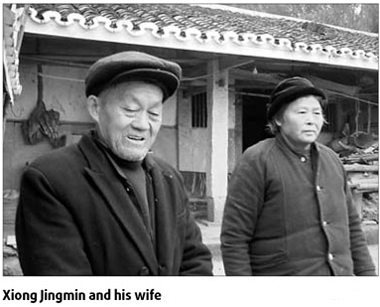Xiong Jingming beamed as he turned on his marsh gas stove, showing off its bright blue flame.
"I like to use this gas. It's very clean and convenient," Xiong said in a strong Sichuan accent.
Since the stove was installed early this year, the 70-year-old farmer from the village of Jingui in the city of Suinin, Sichuan Province, has been free from the burden of having to collect firewood from the nearby hills.
"The gas is so abundant that my wife and I will never run out of it."
Xiong's is just one of 500,000 households to have benefited from a marsh gas program launched last year by the authorities in Sichuan.
From Guang'an to Suining, the round concrete "pools" used to make the gas can be seen in almost every hillside village.
Marsh gas, which is primarily methane, is produced when vegetation and animal waste decomposes in water.
Qu Feng, director of the Sichuan provincial rural energy office, said that as one of the country's main agricultural regions, "Sichuan is well suited to the development of marsh gas."
Since the program was launched, 3.95 million marsh gas pools (14 percent of the national total) have been built in the province. These now benefit some 14 million farmers, he said.
"A single household gas pool with a capacity of 8-10 cu m can produce 350 cu m of marsh gas every year, which is enough to meet the energy needs of a rural family for about 10 months," Qu told China Daily.
"About 1.4 billion cu m of the gas is produced in Sichuan every year."
Based on Qu's figures, by using marsh gas, the average rural family can save up to 600 yuan (US$82) a year, compared with the price of coal, or 1,000 yuan a year, compared with the cost of liquefied gas.
"As well as providing energy, the residual liquid and dregs produced by the fermentation process can be used to fertilize crops and as a natural pesticide," Qu said.
"A single pool can save farmers several hundred yuan a year just on fertilizer."
Each gas pool costs about 1,700 to 1,800 yuan to build and lasts for about 20 years, Qu said.
Xiong said that after the 1,000-yuan subsidy he received from the government, his pool cost him 700 yuan.
"The farmers just need to clean and renovate their pools every three to five years, which costs about 100 yuan a time," Qu said.
"We are in the process of setting up more maintenance and inspection facilities in villages," he said, adding that easy-to-follow instruction leaflets had been handed out to all farmers using gas pools.
"I never thought that one day we would be able to cook a meal without choking on the smoke, or be able to have fuel without trekking into the hills to gather wood," Xiong said.
(China Daily January 3, 2008)






